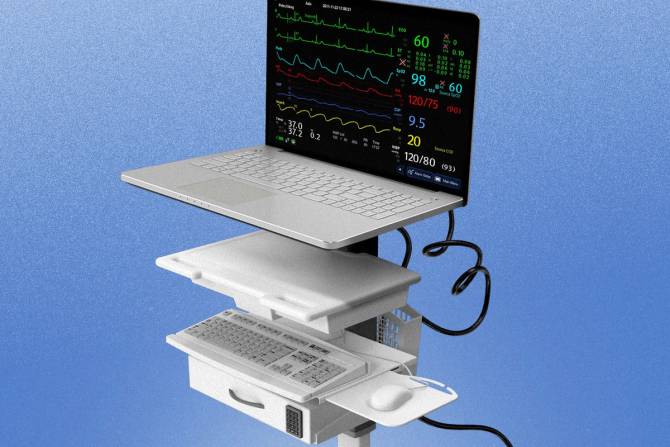Happy Halloween! Spooky season is upon us, and that’s not exclusive to the weather. We’ve heard horror stories from healthcare professionals over the last few years, but we’re looking for a different kind of terror. Have you ever seen something spooky on the job? We’re talking ghosts, spirits, and unexplained phenomena. Sound off on Twitter @healthcarebrew, and we’ll retweet the creepiest ones. Happy hauntings!
In today’s edition:
🩸 Blood shortage
 AI-enabled drug development AI-enabled drug development
 Scary medicine Scary medicine
—Michael Schroeder, Maia Anderson
|
|
Will Varner
For now—like right now—most hospitals seem to have enough blood in their inventory to meet the immediate needs of patients. That’s no small feat given that just this past January, the American Red Cross declared the “first-ever blood crisis,” indicating the country was experiencing “its worst blood shortage in over a decade” amid the omicron surge.
While blood centers and hospitals aim to have at least a five-day supply of blood—enough to treat trauma patients, surgical cases, blood disorders, and other issues—facilities nearly reached blood insolvency during the crisis. The Red Cross said it saw donor turnout dip after the delta variant became dominant in summer 2021, which continued as omicron took over, until blood supplies reached crisis levels in January.
“We went down to many blood centers having only a one-day supply on their shelf,” said Claudia Cohn, chief medical officer at the Association for the Advancement of Blood and Biotherapies (AABB), a nonprofit that develops standards for the industry and accredits blood centers. “Which means one significant event—like a big car crash or a natural disaster or a human-made disaster—could have wiped out the blood supply for that particular metropolitan area.”
Closing up shop: Covid lockdowns shuttered traditional venues for blood drives, including businesses and schools. Even after workers returned to the office and students to classrooms, many organizations were hesitant to allow in-person events to occur in their facilities, including blood drives.
Paying the price: Another dagger undermining the stability of the nation’s blood supply has been a drop in the price paid for blood. Changes in medical practice, like the introduction of minimally invasive procedures, have decreased demand for blood, and hospitals have been able to pay less for it. Keep reading here.—MS
Do you work in healthcare or have information about the industry that we should know? Email [email protected] or DM @MikeSchroederIN on Twitter. For completely confidential conversations, ask Michael for his number on Signal.
|
|
|
Nearly three years into the COVID-19 pandemic, healthcare systems are at a crossroads. Nurses are overworked and undersupported, leading to burnout and compromised care. It’s at this crucial crossroads that you’ll find connectRN.
connectRN is building the future of healthcare by empowering nurses with radical flexibility—meeting them on their terms and bringing a compassionate and logical answer to today’s healthcare crises. The connectRN platform makes it easy to find flexible work opportunities, helping nurses adapt their schedules to their lives and families, not the other way around.
And it doesn’t end with work. connectRN also provides vital resources and a community of support to help nurses build a thriving career.
Change is coming. Embrace radical flexibility today.
|
|
Andriy Onufriyenko/Getty Images
IBM’s Watson might not be your new oncologist, but that doesn’t mean artificial intelligence (AI) is in decline. In fact, its role is growing rapidly in healthcare. Machine learning—a form of artificial intelligence that uses algorithms and data to adapt and predict outcomes—is taking off not only within hospitals, but also in the pharmaceutical industry.
The industry is increasingly turning to machine learning to discover and develop new medications with the hope of expediting the yearslong slog to get new drugs to market—and saving substantial cash. An Insider Intelligence report found AI could decrease the cost of discovering a new drug by as much as 70%, where it currently takes about $2.8 billion and 12+ years, on average, to bring one drug to market.
That promise has attracted growing investment in early-stage startups employing machine learning to discover and develop new drugs, said Jonathan Norris, managing director for business at Silicon Valley Bank’s healthcare unit. He put the amount plowed into seed and Series A funding for companies in this niche at up to $1 billion in the first half of 2022 alone, according to SVB research.
That’s slightly under the pace set in 2021, when $2.4 billion was invested for the calendar year, but Norris said it’s still multiples of the $600 to $700 million invested in 2020—and he doesn’t expect the investment pace to slow. Keep reading here.—MS
Do you work in healthcare or have information about the industry that we should know? Email [email protected] or DM @MikeSchroederIN on Twitter. For completely confidential conversations, ask Michael for his number on Signal.
|
|
Tenor - Young Frankenstein/20th Century Fox via Tenor
In celebration of Halloween, we took a look at three of the spookiest practices that used to be considered “good medicine.” May we take a moment to appreciate how far science has come.
Warning: You probably won’t want to read this while eating.
Monkey balls = fountain of youth! In the 1920s, France-based surgeon Serge Voronoff thought he discovered the fountain of youth: Turns out, all it takes to remain young and sprightly is putting little pieces of monkey testicles in the scrotum! Sweet deal, right? Monkey testicles became the Botox of its day.
Those of you without a scrotum may be wondering, “Well, what am I to do?!” Do not fret—all you have to do is undergo a monkey ovary transplant. Easy peasy.
Shockingly, Voronoff’s brilliant ideas turned out to be ineffective, and results were attributed to a placebo effect. Bummer.
Joint pain? Just sit in this dead whale! In the late 19th century, the “cure” for rheumatoid arthritis in southern coastal Australia became sitting in a rotting whale carcass for 30 hours. Because, obviously, that’s a logical step?
According to Smithsonian magazine, some guy with the condition stumbled upon a carcass and felt cured after his 30 hours. It apparently became a pretty popular thing to do in Eden, Australia, where they thought the practice could cure rheumatoid arthritis for up to a year. Don’t worry, you got to keep your head poking out of the whale during your annual sit.
Holy headache! Thought your headache was bad? Nearly 7,000 years ago, holes were drilled into a person’s head with a sharpened flint to release demons—a practice that continued into the 19th century. Even though “trepanning” was painful and could be deadly, many somehow survived.—MA, MS
|
|
Francis Scialabba
Today’s top healthcare reads.
Stat: Head and neck trauma are part of 70%-90% of domestic-violence incidents, but “little has been done to learn more about the connection between brain injuries and domestic-violence survivors.” (Gothamist)
Quote: “If I’m in a coma, I’m still getting my nails done once a week, and that’s in my will. Cause people are gonna visit me.”—Khloé Kardashian, media personality and Good American co-founder, on her death-bed wishes (Business Insider India)
Read: Ballot initiatives across the country will focus on legalizing recreational cannabis and “magic mushrooms,” as well as legislation on guns and abortion. (Politico)
|
|
-
It cost about $22,000 through employer-based healthcare to insure a family in 2022—a figure that is likely to increase next year.
-
Anti-abortion clinics, or crisis pregnancy centers, are increasingly being funded with taxpayer dollars.
-
Sacramento County’s jail system is failing to give healthcare services to detainees, according to a report from court-appointed monitors.
-
WHO created its first list of fungal infections to keep an eye on, warning they are becoming widespread and can be resistant to drugs.
|
|
Catch up on the top Healthcare Brew stories you may have missed:
|
|
|
Written by
Michael Schroeder and Maia Anderson
Was this email forwarded to you? Sign up
here.
WANT MORE BREW?
{if !contains(profile.lists,"Daily Business")}
Get the daily email that makes reading the news enjoyable →
{/if}
{if !contains(profile.lists,"EmTech Brew") || !contains(profile.lists,"HR Brew") || !contains(profile.lists,"Marketing Brew") || !contains(profile.lists,"Retail Brew") || !contains(profile.lists,"IT Brew") || !contains(profile.lists,"Future Social") || !contains(profile.lists,"CFO Brew")}
Industry news, with a sense of humor →
{if !contains(profile.lists,"CFO Brew")}
-
CFO Brew: your go-to source for global finance insights
{/if}
{if !contains(profile.lists,"EmTech Brew")}
-
Emerging Tech Brew: AI, crypto, space, autonomous vehicles, and more
{/if}
{if !contains(profile.lists,"Future Social")}
-
Future Social: the Brew's take on the world of social media
{/if}
{if !contains(profile.lists,"HR Brew")}
-
HR Brew: analysis of the employee-employer relationship
{/if}
{if !contains(profile.lists,"IT Brew")}
-
IT Brew: moving business forward; innovation analysis for the CTO, CIO & every IT pro in-between
{/if}
{if !contains(profile.lists,"Marketing Brew")}
-
Marketing Brew: the buzziest happenings in marketing and advertising
{/if}
{if !contains(profile.lists,"Retail Brew")}
-
Retail Brew: retail trends from DTC to "buy now, pay later"
{/if}
{/if}
{if !contains(profile.lists,"Money Scoop") || !contains(profile.lists,"The Essentials") || !contains(profile.lists,"Money With Katie")}
Tips for smarter living →
{if !contains(profile.lists,"Incrypto")}
-
Incrypto: Finally, crypto news you can understand
{/if}
{if !contains(profile.lists,"Money Scoop")}
-
Money Scoop: your personal finance upgrade
{/if}
{if !contains(profile.lists,"Money With Katie")}
-
Money With Katie: manifest your financial freedom
{/if}
{if !contains(profile.lists,"The Essentials")}
-
Sidekick: lifestyle recs from every corner of the internet
{/if}
{/if}
 Podcasts →
Business Casual,
Founder's Journal,
Imposters, and
The Money with Katie Show
Podcasts →
Business Casual,
Founder's Journal,
Imposters, and
The Money with Katie Show
 YouTube
YouTube
Accelerate Your Career with our Courses →
|
ADVERTISE
//
CAREERS
//
SHOP
//
FAQ
Update your email preferences or unsubscribe
here.
View our privacy policy
here.
Copyright ©
2022
Morning Brew. All rights reserved.
22 W 19th St, 4th Floor, New York, NY 10011
|
|









